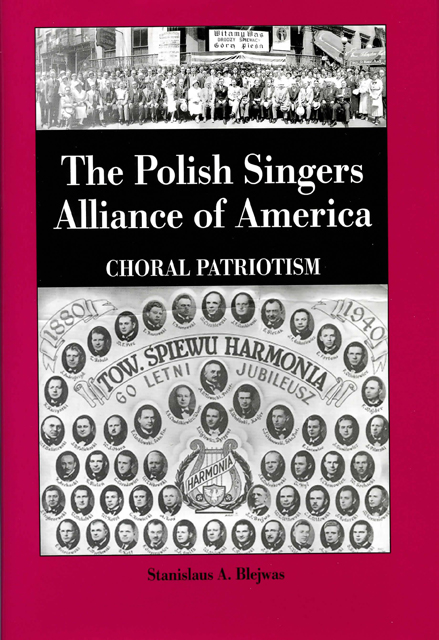Book contents
- Frontmatter
- Contents
- List of Illustrations
- Foreword
- Acknowledgments
- Introduction
- 1 “To Sing Out the Future of Our Beloved Fatherland”
- 2 Pieśni o ziemi naszej (Songs of Our Land)
- 3 The Convention of “Unhappy Memory”
- 4 “Active Duty”
- 5 “Cultural Care”
- 6 World War II and a New Immigration
- 7 The Czechlewski Years: The Ideological Organization Redefined
- 8 Polish American Choral Culture
- 9 “Let Poland Be Poland!”
- 10 Quo Vadis Polish Song in North America?
- Appendix A PSAA National Officers
- Appendix B National Conventions
- Appendix C Individual Choirs
- Appendix D Honorary Members
- Appendix E Compositions of Antoni Małłek Celebrating the Holy Trinity Immigrant Neighborhood in Chicago
- Appendix F Membership
- Appendix G Hlond Trophy Winners
- Appendix H Children’s Choirs
- Appendix I Selected Biographies
- Appendix J Competition Songs, Winning Choirs, and Free Selection at National Conventions of the Polish Singers Alliance of America
- Appendix K Guest Artists and Selections Performed at National and International Conventions of the Polish Singers Alliance of America, 1905–1998
- Appendix L Songs Sung by Choirs at Concerts of the National and International Conventions of the Polish Singers Alliance of America
- Appendix M PSAA Districts and Choirs—1999
- Notes
- Bibliography
- Index
3 - The Convention of “Unhappy Memory”
Published online by Cambridge University Press: 17 March 2023
- Frontmatter
- Contents
- List of Illustrations
- Foreword
- Acknowledgments
- Introduction
- 1 “To Sing Out the Future of Our Beloved Fatherland”
- 2 Pieśni o ziemi naszej (Songs of Our Land)
- 3 The Convention of “Unhappy Memory”
- 4 “Active Duty”
- 5 “Cultural Care”
- 6 World War II and a New Immigration
- 7 The Czechlewski Years: The Ideological Organization Redefined
- 8 Polish American Choral Culture
- 9 “Let Poland Be Poland!”
- 10 Quo Vadis Polish Song in North America?
- Appendix A PSAA National Officers
- Appendix B National Conventions
- Appendix C Individual Choirs
- Appendix D Honorary Members
- Appendix E Compositions of Antoni Małłek Celebrating the Holy Trinity Immigrant Neighborhood in Chicago
- Appendix F Membership
- Appendix G Hlond Trophy Winners
- Appendix H Children’s Choirs
- Appendix I Selected Biographies
- Appendix J Competition Songs, Winning Choirs, and Free Selection at National Conventions of the Polish Singers Alliance of America
- Appendix K Guest Artists and Selections Performed at National and International Conventions of the Polish Singers Alliance of America, 1905–1998
- Appendix L Songs Sung by Choirs at Concerts of the National and International Conventions of the Polish Singers Alliance of America
- Appendix M PSAA Districts and Choirs—1999
- Notes
- Bibliography
- Index
Summary
The history of the Polish Singers Alliance should be understood within the context of the fraternal infighting between the Polish National Alliance and the Polish Roman Catholic Union and the subsequent organizational fractionalization of the immigrant community. The stakes in these polemical wars and organizational splits, which continued through the 1890s and into the first decade of the twentieth century, were high. The participants championed different definitions of Polishness in the debate over “God” and the “Fatherland,” attempting to inculcate into the immigrants’ consciousness their particular version of a Polish national identity. What was at stake was leadership of the growing immigrant community and control over its organizational life. During these two decades, both the Catholic religious leaders and secular nationalists advanced proposals to unify the community's organizational leadership. While every effort eventually foundered, the PNA's attempts to unify American Polonia under its aegis belong as well to the history of the Polish Singers Alliance.
The PNA sought direct control over other immigrant organizations and attempted to achieve this by infiltrating their staffs. Among the primary targets were the Falcons, the Young Men's Alliance, and the Polish Singers Alliance. In each instance, there existed a fairly extensive network of leading officers and activists who belonged to both the PNA and the targeted organization. As mentioned earlier, the Małłek brothers, Maksymiljan Kucera, and Teodor Heliński were but a few of the individuals who held high office in both the PNA and the PSAA. And as the turn of the century approached, the PNA advocated merging the Falcons, the Young Men's Alliance, and the Polish Singers Alliance as constituent parts of the PNA. Ironically, these discussions occurred when the PSAA itself was afflicted with Polonia factionalism and a house divided.
As the PSAA neared the end of its first decade, the singers movement experienced difficulties and internal tensions. In an article about “national song” in Zgoda [Accord], the organ of the Polish National Alliance, Zygmunt Perłowski of Chicago's Moniuszko Choir voiced his worries. Perłowski complained about poor support and popular indifference toward the choral societies, and, in the name of patriotism, “made bold” to appeal to his “brothers” [bracia] not to neglect “the cultivation of our national song.”
- Type
- Chapter
- Information
- The Polish Singers Alliance of America 1888-1998Choral Patriotism, pp. 36 - 49Publisher: Boydell & BrewerPrint publication year: 2005

